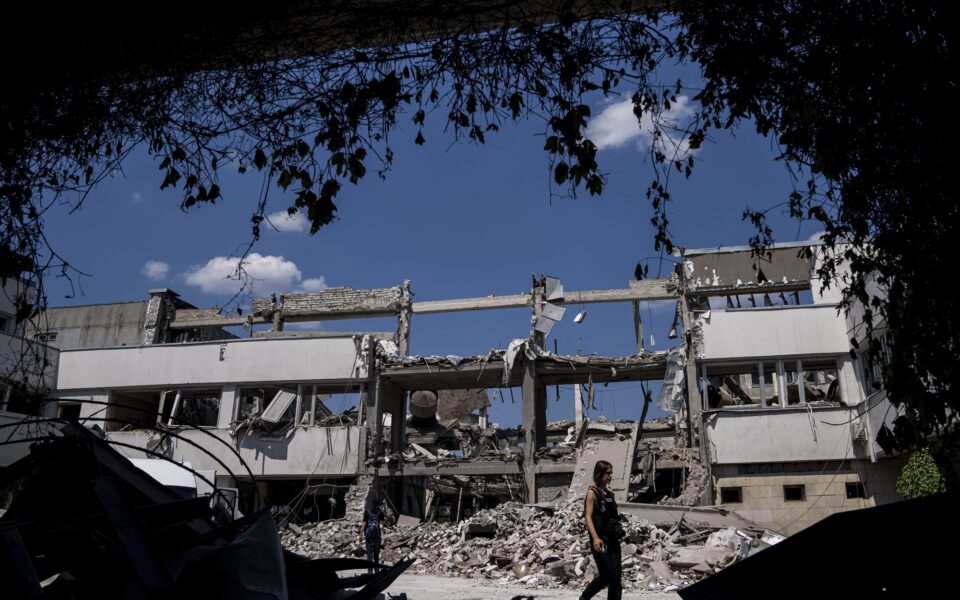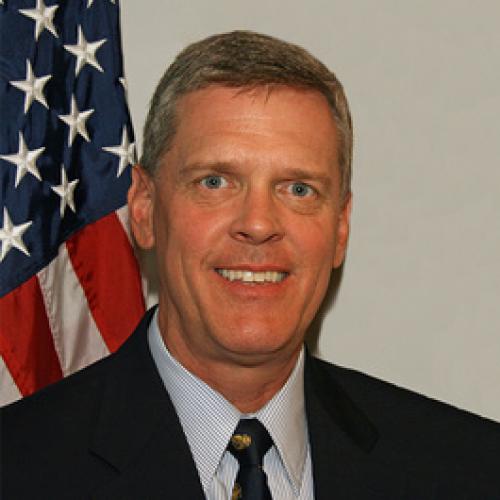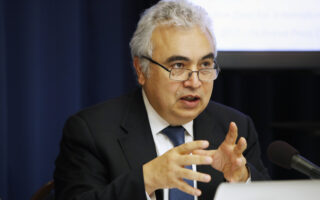The day after for Ukraine – and for Europe
A former US military attache to Russia breaks down Moscow’s tactics, says West has to be ‘prepared for a couple of key problems’

Brigadier General (ret.) Kevin Ryan served as the US military attache to Russia (2001-03), chief of staff of the Army Space and Missile Defense Command, and director of Army Strategic War Plans, Policy and International Affairs of the US Army. He is currently an associate fellow at Harvard Kennedy School’s Belfer Center for Science and International Affairs, a member of the Belfer Center Board of Directors and was the founding director of the center’s US-Russia Initiative to Prevent Nuclear Terrorism.
In this exclusive interview with Kathimerini, Brigadier General Ryan assesses the war in Ukraine.
 What was the motive for Vladimir Putin’s invasion of Ukraine?
What was the motive for Vladimir Putin’s invasion of Ukraine?
President Putin has said many times that he believes Russia is in a war with the West and specifically with the United States and NATO. He has been saying that since before the 2014 invasion of Ukraine and he still maintains that is what is happening now in Ukraine. Ukraine is just a proxy battlefield for a war with the West. The reason he claims is that the United States and NATO and other Western countries support Ukraine with materials. I think that Putin believes that he is in a war with the West. And he has said to the Russian people in his speeches and television appearances since the war started that “Russia needed to begin this war now, rather than wait for the West to begin it on their own terms.” So, it seems to me that Putin has taken the initiative in starting this. We call it the active fighting phase of this war.
Putin believed that Russia had an advantage and it would be advantageous to Russia to start it now.
One more thing about the war is that it is across many domains of conflict. So, it is economic, it is diplomatic, it is informational, it is cyber, it is about intelligence, and it is in the military and the actual army conventional forces. And so even before the actual fighting began on February 24, there were conflicts going on in all these different domains. And when this fighting stops, the active fighting right now that is going on, whenever that stops, the war will continue in these other domains so that people can confuse the fighting with the war.
What is the role of psychological warfare in Russia’s plans?
The Russian military pays a lot of attention to information warfare. And within information warfare, you have cyberattacks, you have signals intelligence, jamming, and you have psychological warfare. I think that their psychological operations are working well inside of Russia. The image and the reporting that they are portraying back to the Russian people is that these operations are to protect the Russian-speaking people in Ukraine and to rid the country of Nazis who have taken over the government and that the cause of the Russian military is noble. But, outside of Russia, this psychological operation has failed miserably almost everywhere in the world. There are very few countries that see the war the way the Russian people see it or the way the Russian government wants people to see it.
We need to be looking at ‘how to negotiate the ending of this war and how to set the stage for Europe to have a better security framework’
What should be the next strategic moves of the US and the Western world?
The United States and the West have to be prepared for a couple of key problems. The first is that we have to be prepared with action if Russia uses a nuclear weapon or a chemical weapon. However, I do not think that there is a high probability that Russia will use those weapons, but we must be ready with good options. If Russia does use a weapon like that it would destroy not only what the nuclear weapon destroyed, but it would destroy the arms control regime that has prevented the use of nuclear weapons since 1945. So, that is one thing that the US and the West have to be prepared for early on.
The second thing we should be prepared for is how to end this conflict or how to begin to repair European security and preserve Ukrainian security going forward. We cannot just congratulate Ukraine on the fact that they survived an attack from Russia and then ignore Russia in our post-war discussions and negotiations because that would just leave Russia as an adversary whose interests are not being addressed, and I fully understand that Russia has been the aggressor here, and nothing from Russia’s interests justify the war that they have started with Ukraine, but history has shown us that if we just ignore Russia, the issues that predated this war will likely bring another conflict of some sort, either in the region or elsewhere. So, the second thing that we have to be looking to is how to negotiate the ending of this war and how to set the stage for Europe to have a better security framework and for Ukraine not just to survive this war, but to begin to prosper, and our goal with Ukraine should be that Ukraine should be as whole and secure as is possible with the ultimate goal of a reunited Ukraine. It probably cannot happen quickly.
What is the role of Russia’s deep state and could it overthrow the current leadership?
I do not think Putin is going to be overthrown by a coup or people inside the government. He has been very careful to keep in power around him people who are completely dependent on the system which he has installed. So, their fate is tied to his fate, and an example of that was a few days before the invasion, President Putin orchestrated a televised meeting with his cabinet in which each of the cabinet members came to the podium and said whether or not they thought Russia should take some sort of action in support of the people of Donetsk and Luhansk, and some of us might have thought that that was just theater to show the Russian public that the cabinet was united in its decision and that Putin was seeking the advice of his advisers, but what that really was was a very public demonstration by Putin that required each member of his cabinet, each of the people close to him to dip their hand in the blood of this operation. It was an interesting way that Putin had of making sure that everyone was responsible for this decision.
Should the Western world be ready for Russia’s invasion of other former Soviet countries?
Well, first, I do not think that Russia will be able to mount a new invasion operation somewhere else in Eastern Europe in the near future for the next few years. Number one, because they will have their hands full fighting in Ukraine or occupying Ukraine, and number two, because their military has suffered a lot of losses and is not performing well and so the Russian general staff will have to go back to the design table and figure out what went wrong and how they can correct it for the future, and that will take time.
Therefore, I do not think that Russia will be invading anyone else soon. But the Russian military is a learning organization, and they will attempt to correct their mistakes and their problems, and, over time, if they are successful, then Russia might consider more operations like this if it feels it needs it.
In the meantime, NATO, which borders Russia, and some other countries like Finland, Sweden, Moldova and so on, all those countries need to consider their own vulnerability in the face of Russian aggression and figure out how they want to be prepared for anything that happens in the future, and so I think those countries will be examining their status and either increasing their military or joining alliances or making choices that will ensure their protection from an invasion in the future.
Is it too early to assess the outcome of the war, or can we see the first signs?
I think we see the first signs already of the outcome of the war. Number one is that Russia will be a weaker country in terms of its international power. It will be weaker because its president has been accused of war crimes and atrocities. It will be weaker because it has ground forces, one of the two pillars of its power, together with nuclear weapons. The ground forces have been shown to be not equal to the task that was set in front of them to fight a country that was one-fourth the size in military.
Furthermore, its economy will be much weaker. So, we can see the outlines of that coming. We do not know exactly what the final boundaries will be within the territory that was Ukraine, but clearly Russia will have gained some territory in that region and will be reluctant to give it up. Ukraine, for its part, will likely not sit idly while its territory remains under occupation. So, we could expect that some sort of low-level resistance might develop in those territories. Therefore, even though we may have ultimately a ceasefire in this fighting, I think that there will still be conflict going forward for many years.





